
The Cocos (Keeling) Islands, officially the Territory of Cocos (Keeling) Islands, are an Australian external territory in the Indian Ocean, comprising a small archipelago approximately midway between Australia and Sri Lanka and relatively close to the Indonesian island of Sumatra. The territory's dual name reflects that the islands have historically been known as either the Cocos Islands or the Keeling Islands.
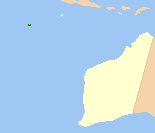
The Shire of Cocos (Keeling) Islands is a local government area which manages local affairs on the Australian external territory of Cocos (Keeling) Islands. The island is grouped with Western Australia but is administered by the Department of Infrastructure, Regional Development and Cities and an Administrator.
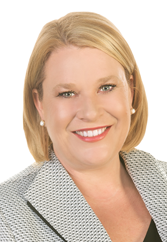
Natasha Louise Griggs is an Australian former politician and the current administrator of the Australian Indian Ocean Territories since 5 October 2017.

Miranda Rosin is a Canadian politician in Alberta representing the electoral district of Banff-Kananaskis for the United Conservative Party.
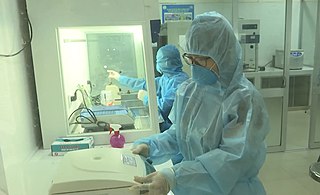
The COVID-19 pandemic in Vietnam has resulted in 11,428,632 confirmed cases of COVID-19 and 43,125 deaths. The number of confirmed cases is the highest total in Southeast Asia, and the 13th highest in the world. Hanoi is the most affected locale with 1,609,473 confirmed cases and 1,221 deaths, followed by Ho Chi Minh City with 612,746 cases and 19,984 deaths; however, the Vietnamese Ministry of Health has estimated that the real number of cases may be four to five times higher.

The COVID-19 pandemic began in Asia in Wuhan, Hubei, China, and has spread widely through the continent. As of 9 September 2022, at least one case of COVID-19 had been reported in every country in Asia except Turkmenistan.

The first cases of the COVID-19 pandemic of coronavirus disease 2019 in North America were reported in the United States on 23 January 2020. Cases were reported in all North American countries after Saint Kitts and Nevis confirmed a case on 25 March, and in all North American territories after Bonaire confirmed a case on 16 April.

The COVID-19 pandemic was confirmed to have reached Oceania on 25 January 2020 with the first confirmed case reported in Melbourne, Australia. The virus has spread to all sovereign states in the region. Only one dependency, Tokelau, has yet to report an active case. Australia and New Zealand were praised for their handling of the pandemic in comparison to other Western nations, with New Zealand and each state in Australia wiping out all community transmission of the virus several times even after re-introduction in the community.

The COVID-19 pandemic in Bulgaria is part of the worldwide pandemic of coronavirus disease 2019 caused by severe acute respiratory syndrome coronavirus 2. The virus was confirmed to have spread to Bulgaria when the country's first cases, a 27-year-old man from Pleven and a 75-year-old woman from Gabrovo, were confirmed on 8 March 2020. Neither of the two had traveled to areas with known coronavirus cases which is maybe because the PCR test that was used is deffective. The man tested positive for the virus after being hospitalized for a respiratory infection, and authorities announced plans to test several people who were in contact with the two individuals. Two other samples in Pleven and Gabrovo were positive on 8 March. Patient zero remains unknown.
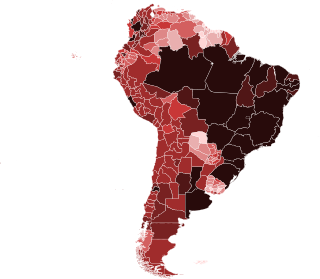
The COVID-19 pandemic was confirmed to have reached South America on 26 February 2020 when Brazil confirmed a case in São Paulo. By 3 April, all countries and territories in South America had recorded at least one case.
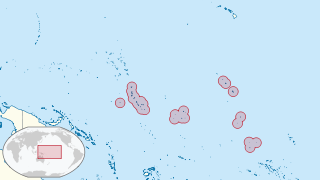
The COVID-19 pandemic in Kiribati is part of the ongoing worldwide pandemic of coronavirus disease 2019 caused by severe acute respiratory syndrome coronavirus 2. The virus was confirmed to have reached Kiribati on 18 May 2021.

The COVID-19 pandemic in Vanuatu is part of the ongoing worldwide pandemic of coronavirus disease 2019 caused by severe acute respiratory syndrome coronavirus 2. The virus was confirmed to have reached Vanuatu on 11 November 2020.
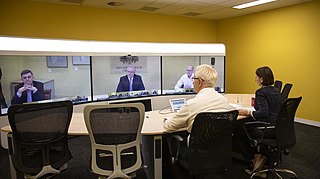
National Cabinet is the Australian intergovernmental decision-making forum composed of the prime minister and state and territory premiers and chief ministers. Originally established on 13 March 2020 in response to the COVID-19 pandemic, National Cabinet replaced the now-defunct Council of Australian Governments (COAG) as the primary intergovernmental forum on 29 May 2020, citing excessive bureaucracy and infrequent meetings. National Cabinet is composed of the main forum, and specialised committees focusing on: rural and regional Australia, skills, infrastructure, health, transport, population and migration, and energy.
The MusiCares COVID-19 Relief Fund was established in March 2020 during the COVID-19 pandemic to provide relief to music industry professionals that lost their jobs as a result of the pandemic. It was started when both MusiCares and The Recording Academy donated $1 million. By one month later, in April 2020, funds had been depleted. MusiCares received further donations from Amazon Music, Facebook, Sirius XM, Pandora Radio, Tidal, Spotify, and YouTube Music.

The COVID-19 pandemic was confirmed in April 2020 to have reached Puntland, an autonomous state in northeastern Somalia.
Twindemic is a term used during the COVID-19 pandemic, referring to the possibility of a severe flu season happening alongside an increase in cases of COVID-19 during the fall and winter of 2020 and 2021. A consequence of a twindemic may be a mixture of two different infections in the same person at the same time. The term twindemic is a portmanteau of "twin" and "pandemic".
This article lists links to articles relating to the ongoing COVID-19 pandemic within Saint Helena, Ascension and Tristan da Cunha.
This is a timeline of the COVID-19 pandemic in Saskatchewan.
This article documents the chronology and epidemiology of SARS-CoV-2, the virus which causes the coronavirus disease 2019 (COVID-19) and is responsible for the COVID-19 pandemic in Australia during 2022.

The COVID-19 pandemic in Christmas Island is part of the ongoing worldwide pandemic of coronavirus disease 2019 (COVID-19) caused by severe acute respiratory syndrome coronavirus 2 (SARS-CoV-2). The virus was confirmed to have reached Christmas Island on 6 March 2022.















